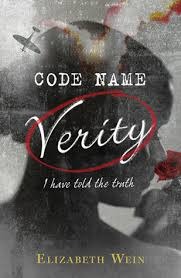
Oct. 11th, 1943 – A British spy plane crashes in Nazi-occupied France. Its pilot and passenger are best friends. One of the girls has a chance at survival. The other has lost the game before it’s barely begun.
When “Verity” is arrested by the Gestapo, she’s sure she doesn’t stand a chance. As a secret agent captured in enemy territory, she’s living a spy’s worst nightmare. Her Nazi interrogators give her a simple choice: reveal her mission or face a grisly execution.
As she intricately weaves her confession, Verity uncovers her past, how she became friends with the pilot Maddie, and why she left Maddie in the wrecked fuselage of their plane. On each new scrap of paper, Verity battles for her life, confronting her views on courage and failure and her desperate hope to make it home. But will trading her secrets be enough to save her from the enemy?
Harrowing and beautifully written, Elizabeth Wein creates a visceral read of danger, resolve, and survival that shows just how far true friends will go to save each other. Code Name Verity is an outstanding novel that will stick with you long after the last page.
[Goodreads]
DETAILS
Date finished: 19 November 2019
Publisher: Egmont Press
ISBN: 9781405258210
Review
Code Name Verity is one of those books that you’ll pick up more out of mild curiosity rather than serious interest. It presents itself as a pretty standard WWII historical fiction, just barely original enough to warrant reading a few pages. And hey – even if it’s nothing special, you tell yourself it’ll make for a cool read if only because it’s centered on two female participants in the war.
It’s all a ruse. That’s how it gets you.
I don’t know how she managed it, but Elizabeth Wein has created something entirely unique out of a sub-genre that – let’s face it – is growing increasingly tired and repetitive. WWII stories with fresh characters, themes, and conflicts are hard to come by – which isn’t all that surprising when you consider the fact that we’ve been writing fiction set in that period for over half a century. Code Name Verity, however, strikes an immensely fragile balance between realism and invention, holding its own as a creative but not unbelievable story. Are Maddie and Julie real characters? Most certainly not. Are their stories rooted in reality? Perhaps. But do they and their narratives feel real? Definitely. And that’s what makes this novel stand out.
Contributing to this steady undercurrent of reality is a strong narrative structure that divides the novel into two discrete sections: the first consists of Julie’s “confessional record”, written in Nazi-occupied France under the supervision of her German captors, while the second switches to Maddie’s journal. I’m not usually a fan of books written almost exclusively in diary-style entries, but I have to admit that this style worked exceptionally well for Code Name Verity. Not only does it create an illusion of historical accuracy in providing the reader with “primary sources”, but it also adds to the novel’s pervading atmosphere of anxiety and anticipation. What, we wonder, are we not being told? What has happened outside of these pages?
Unfortunately, even Code Name Verity couldn’t escape the trap of the diary entry – yes, it may encourage readers to form strong bonds with the writer-character on the other side of the page, but it has always and will always suffer from slow, jerky pacing. But Wein seems conscious of this consequence and combats it creatively: she teases out tension and builds anticipation in the actual writing of the story rather than the plot itself. For example, Maddie might begin a journal entry with a confession that she is too distraught to recount what has just happened to her – causing the reader to respond by imagining the worst possible outcome and anticipating a climax before it actually arrives. Weis’s use of anticlimax, too, is exceptional: there were some points in the novel where I had to stop and reread a passage to make sure that that thing had, in fact, just happened, that I did read it correctly, that it wasn’t itself a nonevent even though it was nestled into the narrative with several other nonevents.
I can’t say much else for fear of spoiling the book for those lucky few who haven’t yet had the chance to read it. (And I mean lucky in the sense that they have a banger of a journey ahead of them.) Code Name Verity is a seriously underrated book, and one that I can even see myself rereading in the near future. Don’t miss out on this beautifully written, exceptionally crafted and highly original historical fiction.
Recommended to: Any (patient) reader fascinated by the Stalinist Era of Russian history.
Recommended to: Any (patient) reader fascinated by the Stalinist Era of Russian history.

I loved this book and the review, thanks for recommending it.
LikeLike